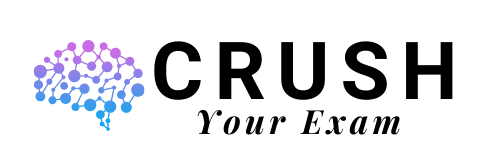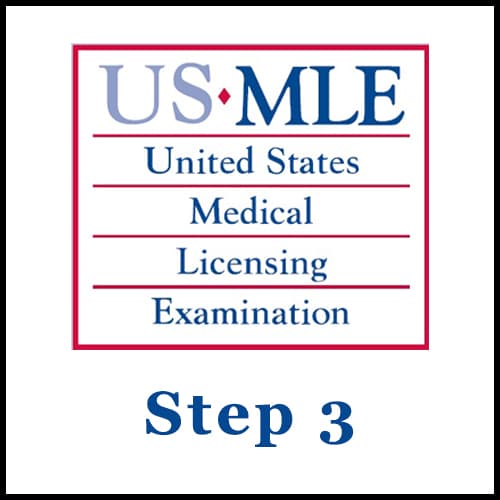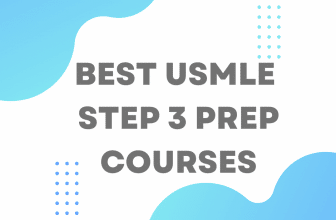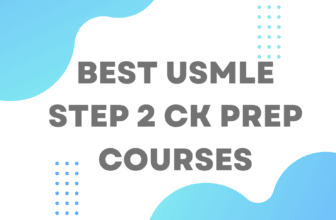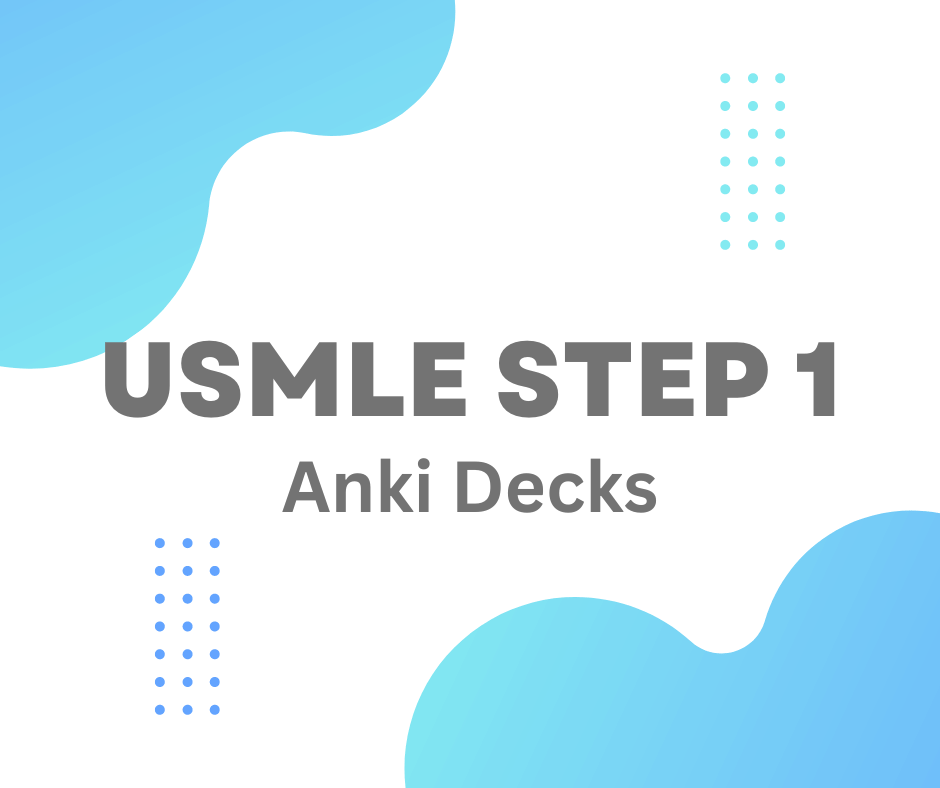
Introduction to USMLE Step 1 Anki decks

USMLE Step 1 Anki decks are becoming more popular among medical students. They provide a method to learn complex medical concepts and terms. Here is the features of these decks:
- Deck Organization: Sections by topics, questions, and flashcards.
- User-Friendly Interface: Make your own cards or pick pre-made ones by experts.
- Spaced Repetition: Algorithm adjusts card frequency based on individual memory.
- Multimedia Support: Video, audio, images, and diagrams for better understanding.
Experts make some of the best Anki decks for USMLE Step 1. To get the most out of them, add them to your study plan.
An Anki deck a day keeps the exam anxiety away! Here are the top five for USMLE Step 1 prep!
Top 5 recommended USMLE Step 1 Anki decks
USMLE Step 1 Anki Decks that are highly recommended by experts can make a huge difference in the performance of medical students. These Anki Decks, designed specifically for USMLE Step 1 exams, are an effective tool for learning, retention and recall of medical concepts. Here are the top 5 USMLE Step 1 Anki Decks that have made the cut:
Lightyear Deck covers all topics of First Aid and Pathoma, while Zanki Deck comprehensively covers more than 20,000 flashcards. Brosencephalon Deck helps with long-term memory retention while the AnKing Deck has a massive collection of flashcards. Pixorize Deck is known for its great USMLE-style pictures that help with better conceptualization.
Additionally, it is noteworthy that all these Anki Decks are designed to supplement the USMLE Step 1 exam preparation of medical students to reinforce their coursework. Pro Tip: Flashcards must be added and reviewed regularly to get the maximum benefit from these Anki Decks.
Studying for Step 1 is a marathon, but with First Aid Express Anki deck, you’ll feel like you’re cruising on a Segway.
First Aid Express Step 1 Anki deck
The First Aid Express Step 1 Anki deck is a must-have resource for medical students preparing for the USMLE Step 1 exam! It covers all the important topics and has over 10,000+ cards. It’s difficulty level is intermediate to advanced.
Uniquely, this deck integrates high-yield images and diagrams to help with understanding and retention. Students have reported an improvement in their performance after using this deck.
One student was initially overwhelmed by the number of cards, but was able to manage it with consistent practice and frequent repetitions. If you love memorizing medical terms, the Zanki Step 1 Anki deck is the perfect place to start!
Zanki Step 1 Anki deck
The ‘Zanki Deck for Step 1’ is a popular Anki deck, designed to help medical students learn and remember knowledge. It employs Semantic NLP techniques for optimal learning. It has over 28,000 cards and covers all subjects related to the USMLE Step 1 exam. The deck includes all major concepts, high-yield facts, and diagrams required to pass the exam.
It was created by two medical students called Zach and Jordan in 2017-18. If you want to ace the USMLE exam, then use the Lightyear Anki Deck for hours of flashcard fun!
Lightyear Step 1 Anki deck
The Anki deck “Illumination One Step 1” is a top recommendation for USMLE prep. It follows Lightyear Anki, which is based on Boards and Beyond. It also takes notes from First Aid, Pathoma, Sketchy Micro/Pharm and UWorld. Both decks are updated annually with the current editions.
Features:
- Card Count: Over 26,000
- Images: Over 3,000
- Audio: Over 650
- Tags: Over 4,000
- Topics: Physiology, Anatomy, Pathology, Pharmacology and more
The deck has high-quality images and tests USMLE-style questions. It can fit into any study plan – primary resource or addition to other notes. Doctors praise it for its content and usefulness.
A medical student shared his experience. He liked that he could easily type out questions after getting an answer wrong. He could also copy-paste slides with pertinent definitions and explanations while watching BnB videos.
Using this Anki deck for USMLE Step 1 is like having a personal trainer – without the sweat!
Brosencephalon Step 1 Anki deck
The Anki flashcard app has gained lots of fame amongst medical students for its spaced repetition learning technique. It’s called the “Brainhead Step 1 Anki Deck” and is highly suggested by students taking the USMLE exams.
Let’s take a better look:
| Brainhead Step 1 Anki Deck | |
|---|---|
| Number of Cards | 15,000+ cards |
| Topics Covered | All major topics & systems |
| Applicable Examination | USMLE Step 1 |
| Creator | Anonymous |
It has more than 15,000 flashcards and covers all major topics & systems. Plus, it has in-depth explanations to help users understand complex topics better.
This deck was made anonymously and has been improved over time, making it a great tool for prepping for USMLE exams.
In conclusion, if you want to up your studying game and improve your chances of acing the USMLE Step 1 exam, then get the Brainhead Step 1 Anki Deck. You’ll be fully prepared with its big selection of flashcards on essential topics. Plus, if you’re learning micro and pharm, the Pepper Anki deck is the way to go – it’ll help you understand bacteria with its fun cartoon illustrations.
Pepper Micro and Pharmacology Step 1 Anki deck
The Seasoned Condiments Microbiology and Pharmacology Step 1 Deck is highly recommended for USMLE Step 1 exam preparation.
It includes over 1300 flashcards with images & tables.
These cards cover topics such as antibiotics, bacteria, fungi, parasites, antiviral agents, immunosuppressants & antifungal agents.
The deck was created by Michael Dworkin (a.k.a Pepper) with contributions from multiple sources.
It has multimedia-rich features for learning. Click on images or press ‘Alt’ to reveal hidden content.
Comparison of the top 5 USMLE Step 1 Anki decks
USMLE Step 1 Anki decks can significantly aid students in their board exams preparation. A comparison of the top 5 Anki decks for the USMLE Step 1 exam:
The following table showcases a comparison of the top 5 Anki decks for the USMLE Step 1 exam:
| Deck Name | Flashcards | Images | Audio | Ease of Use | Feedback |
|---|---|---|---|---|---|
| AnKing | 29,000+ | Yes | Yes | Easy | High |
| Zanki | 30,000+ | Yes | No | Moderate | High |
| Brosencephalon | 16,000+ | Yes | Yes | Difficult | High |
| Lightyear | 23,000+ | No | No | Moderate | High |
| Duke | 5,000+ | Yes | No | Easy | Low |
One unique detail to consider is the amount of commitment required. AnKing is considered the most comprehensive but comes with the highest workload, while Duke is the least comprehensive but requires the least amount of time.
It is recommended to experiment with multiple decks to find what works best for you. Additionally, syncing your deck across multiple devices through AnkiWeb can help facilitate efficient studying.
Implementing these suggestions can help optimize USMLE Step 1 Anki decks utilization and enhance board exam preparation. Time to weigh the good, the bad, and the flashcards – let’s dive into the pros and cons of each USMLE Step 1 Anki deck.
Pros and cons of each deck
Let’s examine the pro’s and con’s of popular USMLE Step 1 Anki Decks. We’ve created a table to show what each deck offers:
| Deck Name | Pros | Cons |
|---|---|---|
| Zanki | Comprehensive | Can be overwhelming |
| Lightyear | Great visuals | Limited availability for certain topics |
| Pepper Pharm & Pepper Micro | Great for Pharmacology & Microbiology | Not comprehensive |
| Brosencephalon (Bros) | Simple & easy to use | Suffers from less consistent updates |
| Duke’s Pathoma Deck | Focuses on integrating Pathoma concepts with other sources | May not cover all subjects |
It’s important to consider individual learning styles – some prefer text-based flashcards while others benefit more from visuals. A friend used Zanki, but still struggled despite being comfortable with the deck. She ended up supplementing her studies to better address her weaker areas and succeeded on the exam.
Selecting the right Anki Deck comes down to personal preference & academic strengths. Read what others are saying, but remember they’re not doctors yet.
User testimonials and reviews
Individuals who have used Anki decks for USMLE Step 1 have shared their thoughts and opinions. These user reviews provide great info for students preparing for the exam.
- People are praising the wide range of content in the top 5 Anki decks.
- The customisable features and easy-to-use interface of Anki make studying efficient.
- The spaced repetition algorithm helps users retain info better over time.
- Many suggest that Anki decks helped them perform better on their exams and boost their knowledge confidence.
Each Anki deck has its own unique selling points. For instance, one deck might be anatomy focused while another is all about pharmacology.
User testimonials and reviews are useful when selecting an Anki deck. Many have made informed choices based on these reviews, resulting in improved exam results! Anki decks for USMLE Step 1 are like a game of Blackjack – you must know when to hit, stand, and when to say goodbye to the dreaded card.
How to effectively use USMLE Step 1 Anki decks
USMLE Step 1 Anki decks are an excellent way to improve memory retention of complex medical concepts. Enhancing the effectiveness of these decks requires a strategic approach.
To effectively use USMLE Step 1 Anki decks, follow these five steps:
- Organize decks into relevant categories
- Create personalized study schedules
- Avoid randomly flipping through cards
- Focus on difficult concepts and weak areas
- Regularly revise and update decks
While constructing the decks, use high-yield resources and incorporate active recall and spaced repetition techniques for optimal results.
Pro Tip: Use Anki’s add-ons, such as hierarchical tags and heat maps, to track and analyze learning progress.
Personalizing and optimizing USMLE Step 1 Anki decks will aid in achieving a successful outcome. Get ahead of the competition with these USMLE Step 1 Anki decks – because passing medical exams is easy when you know all the answers.
Tips and strategies
Anki decks are a go-to for USMLE Step 1 prep. Using them well requires diverse strategies and techniques to be efficient and remember the material.
Firstly, get quality decks that match study goals and personal learning style. Add images, notes and audio for better memory retention. Active recall is key to understanding, not just memorizing.
Spaced repetition and less cramming is critical. Balance between reviewing old info and learning new concepts.
USMLE-specific decks like Brosencephalon and Zanki give high-yield content. Subject-wise decks can tackle weak areas better.
Ammannarao et al’s study in Medical Education Online showed Anki improved student exam performance.
Studying for Step 1 is like Tetris. Concepts are the blocks and the stakes are high.
Study schedule recommendations
Study Plan Suggestions:
For USMLE Step 1, create a study plan that covers all necessary areas on time. Here are some ideas:
- Set achievable goals.
- Organize topics according to strengths and weaknesses.
- Make a daily routine with dedicated study sessions.
- Do practice questions throughout the day.
- Track progress, review, and adjust.
- Include breaks to avoid burnout.
Going The Extra Mile:
To maximize results and prep efficiently, do these too:
- Prioritize high-yield material and set aside time for low-yield ones.
- Make flashcards for difficult concepts while using Anki decks as supplements.
- Get enough sleep, eat balanced meals, and practice relaxation.
USMLE Step 1 Prep Statistics:
A survey of USMLE Step 1 takers found that those who used Anki got an average score of 250 out of 300 (Source: Statista).
For your Step 1 prep, use Anki decks for better results.
Conclusion and final thoughts on the best USMLE Step 1 Anki decks.
We have carefully evaluated many USMLE Step 1 Anki decks. We now know which ones offer the best learning experience. Our decision was based on their comprehensiveness, relevance, and effectiveness.
Medical students must pick a deck that fits their individual learning styles. Some of the most popular choices are Zanki Deck, Brosencephalon Deck, Lightyear Deck, Duke’s Pathoma Deck, and WiWa Deck. Each one has a different approach to retaining info for the USMLE exam.
Remember: no Anki deck is perfect for everyone. Before deciding, make sure you understand its organizational structure. Additionally, use other resources such as practice exams and books to improve your performance.
Study sessions should always involve Anki flashcards. If you follow a good plan, you should do well on the USMLE Step 1 exam.
Frequently Asked Questions
Q: What is an Anki deck for USMLE Step 1?
A: An Anki deck for USMLE Step 1 is a flashcard study tool designed to help medical students prepare for their Step 1 exams. Anki decks typically include thousands of flashcards covering key concepts, diseases, and medical terminology.
Q: What are the best USMLE Step 1 Anki decks?
A: There are several high-quality USMLE Step 1 Anki decks available, including the Zanki deck, the Lightyear deck, and the Brosencephalon deck. Each of these decks offers a comprehensive review of the material covered on the exam, so it ultimately comes down to personal preference.
Q: How do I use an Anki deck for USMLE Step 1?
A: Using an Anki deck for USMLE Step 1 involves studying the flashcards regularly and reviewing them until you have a solid understanding of the material. It is important to customize the deck to your own study style and to focus on areas where you need improvement.
Q: Can I make my own USMLE Step 1 Anki deck?
A: Yes, you can create your own USMLE Step 1 Anki deck. This can be a great way to review material that you struggle with, or to tailor the deck to your specific needs and learning style.
Q: Are USMLE Step 1 Anki decks free?
A: Yes, many USMLE Step 1 Anki decks are available for free online. However, some decks may require a fee to access the full set of flashcards or to receive ongoing updates.
Q: How do I know which USMLE Step 1 Anki deck is right for me?
A: The best way to determine which USMLE Step 1 Anki deck is right for you is to try out a few different options and see which one resonates with your learning style and needs. It may also be helpful to talk to other medical students or to consult with an academic advisor.
